-
 Bitcoin
Bitcoin $112400
-1.07% -
 Ethereum
Ethereum $3409
-3.27% -
 XRP
XRP $2.784
-6.60% -
 Tether USDt
Tether USDt $0.9997
-0.03% -
 BNB
BNB $739.3
-2.09% -
 Solana
Solana $158.0
-2.90% -
 USDC
USDC $0.9998
-0.02% -
 TRON
TRON $0.3213
-0.94% -
 Dogecoin
Dogecoin $0.1929
-5.01% -
 Cardano
Cardano $0.6974
-2.82% -
 Hyperliquid
Hyperliquid $36.69
-2.31% -
 Sui
Sui $3.327
-4.80% -
 Stellar
Stellar $0.3672
-5.18% -
 Chainlink
Chainlink $15.65
-3.07% -
 Bitcoin Cash
Bitcoin Cash $525.0
-1.68% -
 Hedera
Hedera $0.2291
-6.00% -
 Avalanche
Avalanche $20.91
-2.96% -
 Ethena USDe
Ethena USDe $1.000
0.00% -
 Toncoin
Toncoin $3.520
-1.12% -
 UNUS SED LEO
UNUS SED LEO $8.968
0.14% -
 Litecoin
Litecoin $105.7
0.26% -
 Shiba Inu
Shiba Inu $0.00001181
-1.79% -
 Polkadot
Polkadot $3.492
-2.08% -
 Uniswap
Uniswap $8.800
-3.10% -
 Dai
Dai $0.9999
-0.01% -
 Monero
Monero $289.9
-3.17% -
 Bitget Token
Bitget Token $4.243
-1.27% -
 Pepe
Pepe $0.00001006
-3.67% -
 Cronos
Cronos $0.1248
-5.68% -
 Aave
Aave $249.7
-2.50%
What impact do cryptocurrency ETFs have on the digital asset market?
Cryptocurrency exchange-traded funds (ETFs) offer increased accessibility, diversification, regulatory compliance, and improved market liquidity, making them an attractive investment vehicle for traditional investors and institutions alike.
Feb 22, 2025 at 10:25 am
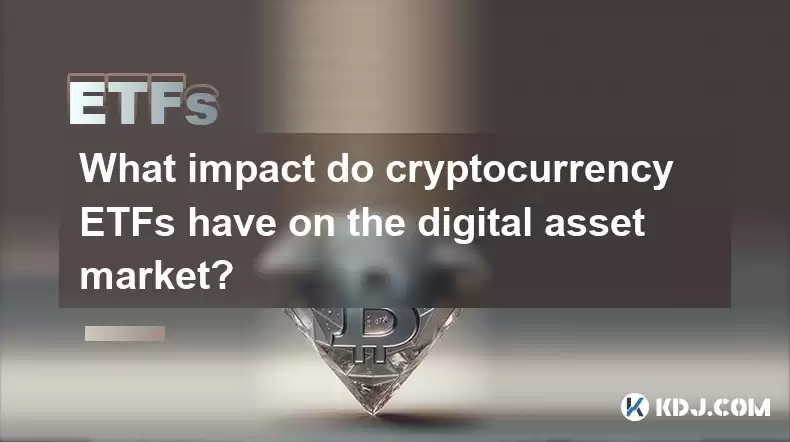
Key Points:
- Increased Accessibility: ETFs make it easier for investors to access cryptocurrencies without directly buying, storing, or securing them.
- Diversification and Risk Reduction: ETFs offer diversified exposure to multiple crypto assets, reducing risk compared to investing in a single cryptocurrency.
- Institutional Involvement: ETFs attract institutional investors, bringing stability and credibility to the cryptocurrency industry.
- Regulatory Compliance: ETFs meet regulatory requirements, enhancing the legitimacy and trust in the digital asset market.
- Price Discovery and Market Liquidity: ETFs improve price discovery mechanisms, enhance market liquidity, and support price stability.
Impact on the Cryptocurrency Market:
1. Increased Accessibility:
- ETFs provide a familiar and regulated investment vehicle for traditional investors, lowering barriers to entry.
- They offer low minimum investment requirements, making it accessible to a broader audience.
- ETFs facilitate fractional ownership, allowing investors to invest in fractions of a cryptocurrency.
2. Diversification and Risk Reduction:
- ETFs hold a basket of cryptocurrencies, providing instant diversification.
- This reduces the risk associated with investing in a single volatile asset.
- ETFs allow investors to diversify their portfolios across different crypto asset classes and risk profiles.
3. Institutional Involvement:
- ETFs appeal to institutional investors seeking exposure to crypto assets but lack the expertise or IT infrastructure to invest directly.
- Institutional participation provides stability and credibility to the cryptocurrency industry.
- ETFs bridge the gap between traditional finance and the burgeoning digital asset market.
4. Regulatory Compliance:
- ETFs are subject to regulatory oversight and compliance requirements, providing investors with protection and reassurance.
- They follow established investment guidelines and adhere to SEC reporting standards.
- ETFs enhance the transparency and accountability of the cryptocurrency industry.
5. Price Discovery and Market Liquidity:
- ETFs create a continuous market for cryptocurrencies, facilitating price discovery and price stability.
- They provide a transparent platform for buyers and sellers to trade, improving market liquidity.
- ETFs allow investors to access real-time pricing and trade cryptocurrencies without the complexities of decentralized exchanges.
FAQs:
Who benefits from cryptocurrency ETFs?
- Individual investors seeking diversified exposure, risk reduction, and accessibility.
- Institutional investors seeking exposure to the cryptocurrency market without direct involvement.
- Cryptocurrency enthusiasts who want to enhance their portfolio diversification.
How do cryptocurrency ETFs differ from buying cryptocurrencies directly?
- ETFs provide diversified exposure, regulatory compliance, and ease of access.
- Direct cryptocurrency purchases require secure storage, technical expertise, and potential security risks.
What risks are associated with cryptocurrency ETFs?
- Cryptocurrency market volatility can lead to price fluctuations in the underlying assets.
- Fees and expenses associated with ETF management can reduce potential returns.
- Regulatory changes or shifts in market sentiment can impact ETF performance.
Disclaimer:info@kdj.com
The information provided is not trading advice. kdj.com does not assume any responsibility for any investments made based on the information provided in this article. Cryptocurrencies are highly volatile and it is highly recommended that you invest with caution after thorough research!
If you believe that the content used on this website infringes your copyright, please contact us immediately (info@kdj.com) and we will delete it promptly.
- BlockDAG, SEI, Ethena: Top Crypto Performers Under the Microscope
- 2025-08-03 10:50:16
- Bitcoin Blasts Past $119K: How Institutional Adoption and Macro Shifts Fuel the Fire
- 2025-08-03 10:55:16
- Crypto, Grok, and August: Decoding the Latest Trends and Insights
- 2025-08-03 11:10:16
- Crypto, Phishing, and Your Wallet: A New Yorker's Guide to Staying Safe
- 2025-08-03 10:30:16
- Troller Cat Meme Coin Presale Soars: A New King in the Crypto Jungle?
- 2025-08-03 10:30:16
- Grayscale, Altcoin Trust, and Mid-Cap Mania: What's the Deal?
- 2025-08-03 08:50:16
Related knowledge

What role does SEC play in Bitcoin ETF approval?
Feb 25,2025 at 06:48am
Key Points:SEC's Role in Bitcoin ETF Approval ProcessHistorical Efforts to Establish a Bitcoin ETFSEC's Criteria for Bitcoin ETF ApprovalPotential Imp...

Who is eligible to issue Bitcoin ETFs?
Feb 25,2025 at 11:13am
Key Points:Only regulated financial institutions with the necessary expertise and infrastructure are eligible to issue Bitcoin ETFs.The Securities and...
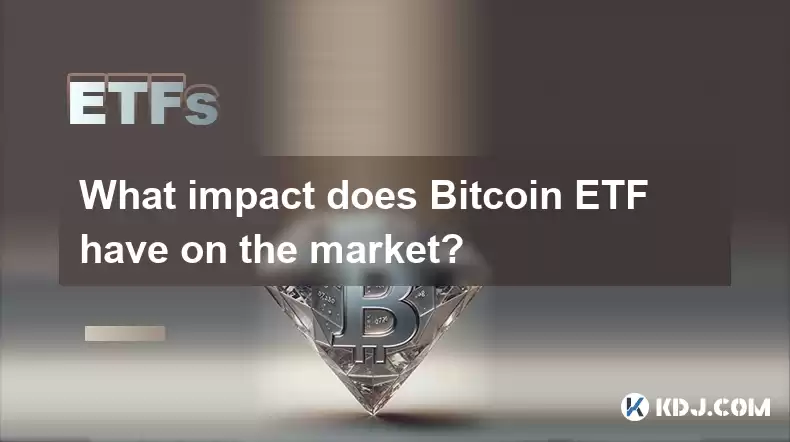
What impact does Bitcoin ETF have on the market?
Feb 25,2025 at 11:37am
Key Points:Introduction to Bitcoin ETFs and their role in the cryptocurrency marketHistorical development and performance of Bitcoin ETFsPotential ben...
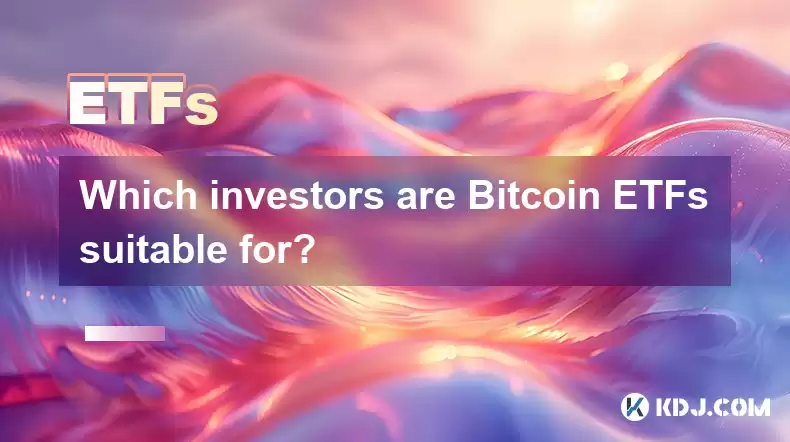
Which investors are Bitcoin ETFs suitable for?
Feb 27,2025 at 04:01pm
Key Points:Understanding Bitcoin ETFsBenefits of Bitcoin ETFsSuitability of Bitcoin ETFs for Different InvestorsAssessing Risk Tolerance and Investmen...
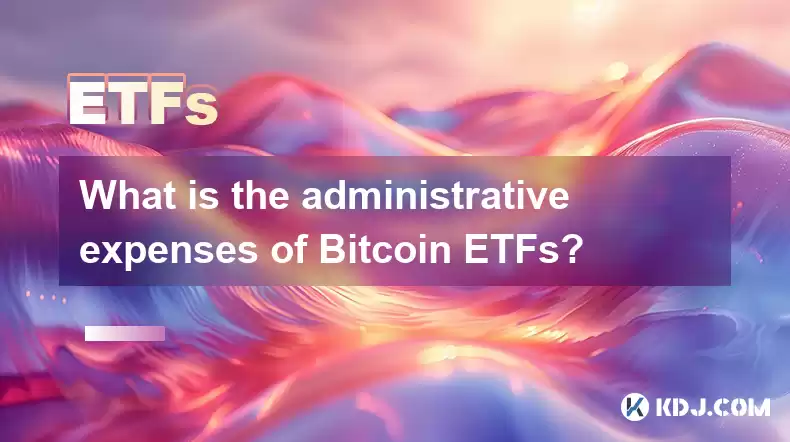
What is the administrative expenses of Bitcoin ETFs?
Feb 26,2025 at 12:24am
Key Points:Administrative expenses are a crucial factor to consider when evaluating Bitcoin ETFs.These expenses can significantly impact the performan...
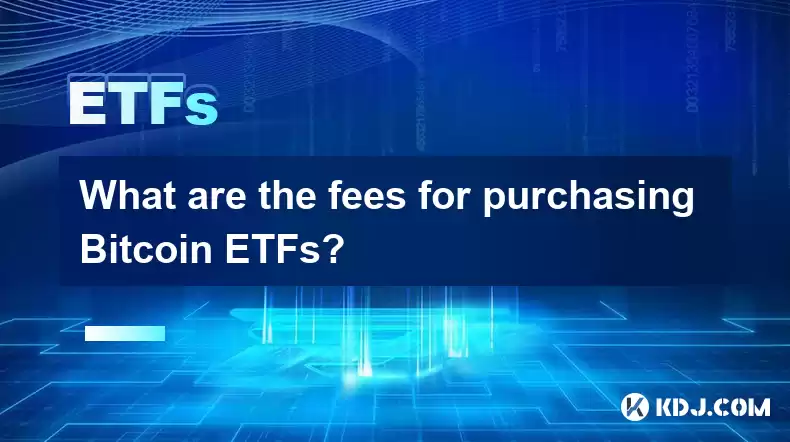
What are the fees for purchasing Bitcoin ETFs?
Feb 27,2025 at 07:13pm
Key Points:Bitcoin exchange-traded funds (ETFs) are a cost-effective and regulated way to gain exposure to Bitcoin.Fees associated with Bitcoin ETF pu...

What role does SEC play in Bitcoin ETF approval?
Feb 25,2025 at 06:48am
Key Points:SEC's Role in Bitcoin ETF Approval ProcessHistorical Efforts to Establish a Bitcoin ETFSEC's Criteria for Bitcoin ETF ApprovalPotential Imp...

Who is eligible to issue Bitcoin ETFs?
Feb 25,2025 at 11:13am
Key Points:Only regulated financial institutions with the necessary expertise and infrastructure are eligible to issue Bitcoin ETFs.The Securities and...

What impact does Bitcoin ETF have on the market?
Feb 25,2025 at 11:37am
Key Points:Introduction to Bitcoin ETFs and their role in the cryptocurrency marketHistorical development and performance of Bitcoin ETFsPotential ben...

Which investors are Bitcoin ETFs suitable for?
Feb 27,2025 at 04:01pm
Key Points:Understanding Bitcoin ETFsBenefits of Bitcoin ETFsSuitability of Bitcoin ETFs for Different InvestorsAssessing Risk Tolerance and Investmen...

What is the administrative expenses of Bitcoin ETFs?
Feb 26,2025 at 12:24am
Key Points:Administrative expenses are a crucial factor to consider when evaluating Bitcoin ETFs.These expenses can significantly impact the performan...

What are the fees for purchasing Bitcoin ETFs?
Feb 27,2025 at 07:13pm
Key Points:Bitcoin exchange-traded funds (ETFs) are a cost-effective and regulated way to gain exposure to Bitcoin.Fees associated with Bitcoin ETF pu...
See all articles

























































































